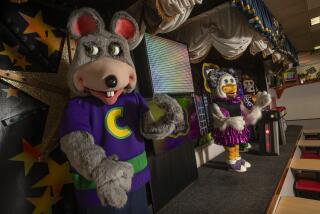Restaurant Chain Satisfies Its Investors’ Appetites for Growth
- Share via
CALABASAS — The Cheesecake Factory lately has been showing just how far it has come from its roots as a small shop in Detroit.
The Calabasas-based company’s stock price climbed 57.27% to $43.25 in the third quarter, making it one of the biggest gainers among publicly held Valley-based companies during the quarter in terms of stock price increase.
For the last 12 months, the company’s stock is up 133.78%, boosted by earnings that repeatedly have surpassed analysts’ expectations, plus an expansion potential that analysts consider a solid foundation for the future.
“The reason the stock is up is simply that they’re doing a good job and investors are recognizing them for their accomplishments,” said Allan F. Hickok, an analyst with U.S. Bancorp Piper Jaffray in Minneapolis.
In July, the Cheesecake Factory reported record increases in revenue and earnings for its fiscal second quarter ended June 27, including a 23% increase in revenue to $105.2 million, a 55% boost in income to $8.2 million and net income per share that was up 47% to 25 cents.
Dennis I. Forst, an analyst with McDonald Investments in West Los Angeles, says rising revenue and earnings at the company are a sign of “an extraordinary performance.”
“There have been some other restaurant stocks that have done fairly well, but restaurant stocks in general have had a mediocre year. The Cheesecake Factory really stands out as the top performer in the restaurant stocks I cover,” Forst said.
Despite its solid financial performance, Forst said he can’t quite explain why the company’s stock has climbed so quickly, except that it could be that investors are giving it extra credit for not making the mistakes of some other restaurant chains. He said it has become even more of a Wall Street favorite than might be expected from its performance.
Its status as a Wall Street favorite shows how far the Cheesecake Factory has come since Evelyn Overton opened a small cheesecake shop in Detroit in the late 1940s.
According to company history, Overton later moved the business to her kitchen so she could be home to raise her children, David and Renee.
In 1972, Evelyn and her husband, Oscar, moved the business to Los Angeles. They opened their first full-service restaurant in 1978 in Beverly Hills, and the company went public in 1992. Son David is now the chairman and chief executive of the Cheesecake Factory.
“The Beverly Hills unit still has positive sales comparisons after 23 years, which is highly unusual in the restaurant business,” Hickok said.
Yet the Cheesecake Factory is still relatively small, with 37 restaurants, and “could grow to several times the size it is today,” Hickok said.
The Cheesecake Factory has opened three new restaurants this year and has another five under construction. Company officials say they expect to open up to 10 more stores in 2001.
According to Forst, the Cheesecake Factory’s success has resulted from what it hasn’t done as well as what it has done.
“One of the things they’ve done right is basically not changed, and they haven’t overexpanded or made any of the mistakes that a lot of companies have made in recent years in the restaurant industry,” Forst said.
“It’s still a relatively small company in a huge business, so there is a lot of room for growth, assuming that they stick to their proven formula of controlled expansion,” Forst said.
*
The company’s financial performance of late is a product of its controlled growth, efficient operations and a management system that is now set up to continue expansion, according to Gerald W. Deitchle, executive vice president and chief financial officer.
“I think Wall Street views us as one of a few very high-quality, well-run companies in our casual dining category that have a very strong growth potential,” Deitchle said. “As a result of that, we seem to be afforded higher valuations [in our stock price] than other companies in the restaurant industry.”
With 37 restaurants, the Cheesecake Factory has tapped only part of its potential, said Deitchle, who estimated there is a market for 150 to 200 of the restaurants in the U.S.
Controlled growth and getting customers to return again and again are keys to the company’s success, Deitchle said.
“Restaurant companies have to resist the temptation to run the train off the tracks, which often happens in this industry because, when restaurant companies go public, Wall Street affords the companies a great deal of capital for growth,” Deitchle said.
But then, Deitchle added, Wall Street also sets high growth objectives, and some restaurant chains try to expand too quickly before they have the right management systems in place.
The Cheesecake Factory did endure some growing pains in the mid-1990s after going public, according to Deitchle, who said those growing pains led to a sharp drop in profit in 1997 despite increased revenue.
*
“When we went public, we had only five restaurants and a leased bakery manufacturing facility that was running very close to capacity. The company at that time had very little growth infrastructure. It didn’t have the type of middle-management team and the right types of systems and processes in place to provide a foundation for growth,” Deitchle explained.
Adding a new bakery and establishing a middle level of management to ensure growth resulted in some one-time expenses that were a drag on the company’s finances, Deitchle said, but that’s now behind the company, which he said is positioned for continued growth.
“We see the Cheesecake Factory brand as one of the emerging leaders in consumer businesses in America,” he said, “as long as we keep the train on the tracks.”
More to Read
Eat your way across L.A.
Get our weekly Tasting Notes newsletter for reviews, news and more.
You may occasionally receive promotional content from the Los Angeles Times.










